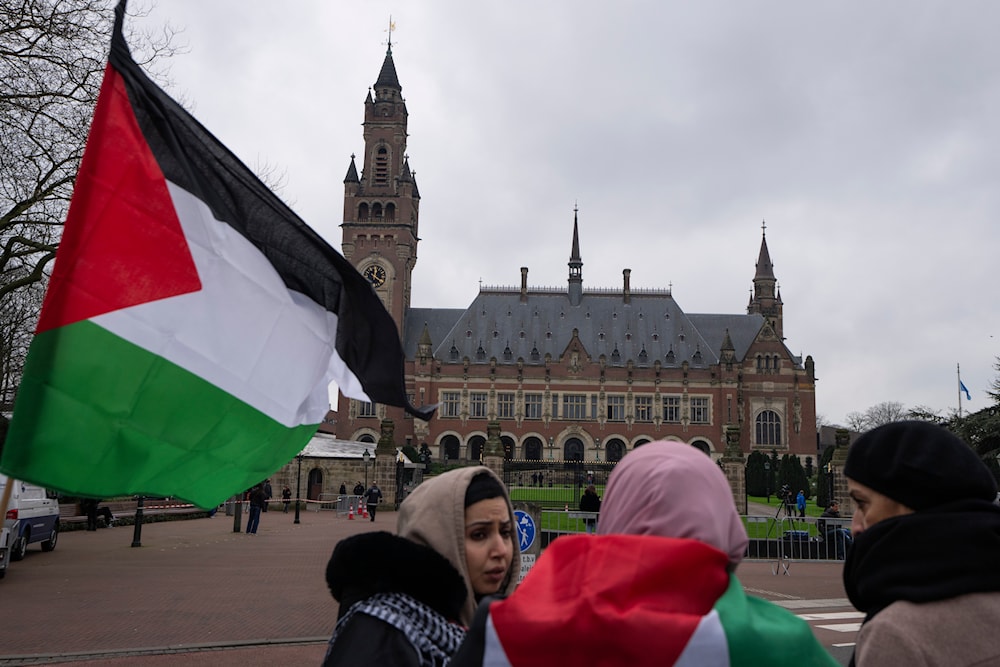Ireland to intervene in South Africa's ICJ case against 'Israel'
Ireland underlines that it is preparing to intervene in the ICJ case raised by South Africa against the Israeli occupation.
-

A Palestinian flag flies outside the United Nations' highest court, rear, during historic hearings in The Hague into the Israeli occupation of occupied Palestine, Netherlands, Wednesday, February 21, 2024 (AP)
Ireland has a basis to intervene in the International Court of Justice (ICJ) case raised by South Africa against the Israeli occupation over the ongoing genocide in Gaza.
Irish Deputy Prime Minister Micheal Martin said a thorough examination had been conducted to assess the feasibility of Ireland's intervention. Following comprehensive briefings, Martin affirmed the presence of a "basis" for potential intervention, indicating that his country was preparing to join the legal battle.
South Africa has brought "Israel" before the court, alleging violations of the UN's Genocide Convention. The case revolves around the Israeli occupation's military campaign in Gaza ongoing since October 7, which has thus far killed more than 32,000 people and wounded over 74,000 others.
The United Nations has highlighted dire humanitarian consequences, with a quarter of Gaza's 2.3 million population facing starvation, and approximately 80% displaced from their homes.
In response to South Africa's legal action, an interim ruling from the International Court of Justice (ICJ) ordered the Israeli occupation to refrain from genocidal acts in Gaza, though it stopped short of mandating a ceasefire.
Israeli violations
South Africa's Foreign Minister, Naledi Pandor, said that "Israel" had disobeyed the ICJ's January verdict that it should take steps to prevent genocide in the Gaza Strip.
Pandor told the Carnegie Endowment for International Peace during a visit to the US capital, Washington, that the occupation has "entirely ignored" the provisional measures set by the court.
This was reiterated by UN special rapporteur on the occupied territories, Francesca Albanese, who declared that "Israel" is violating orders issued by the International Court of Justice (ICJ) to immediately protect Palestinians’ rights and cease all activities amounting to genocide.
"Israel" is required to "take all measures within its power to prevent and punish the direct and public incitement to commit genocide" against Palestinians in Gaza, after proof was found of "discernibly genocidal and dehumanizing rhetoric coming from senior Israeli government officials."
Martin underscored the urgency of the dire situation in Gaza, labeling it a "humanitarian catastrophe" and added, "Clearly, aid is being prevented from going in, but the most vital essentials of life are being prevented from going into Gaza. This constitutes significant harm and destruction to a people and to the people of Gaza."
The Irish deputy leader went on to stress his country's commitment to pursuing justice, adding that he requested "very serious" legal work be done due to the stringent nature of the tests applied under the Genocide Convention.
"I had asked my legal staff to do preliminary legal work, last week I was briefed by my legal team in that respect and we believe we have a basis now for an intervention, obviously more substantive work has to be done," he stressed.
He added that the issue would be brought back to the government for a more formal decision after South Africa files its case and further legal assessments are done.
He said involving a third party in an ICJ case is a "rare" and "complex" matter but underlined that the dire situation in Gaza calls on Ireland to join the legal battle.
Rafah case
The South African government announced that it had appealed to the International Court of Justice (ICJ), seeking its intervention to assess whether the potential Israeli offensive in Rafah warranted the court's use of its authority to prevent additional violations of Palestinians' rights.
About 1.4 million Palestinians have been crowded into Rafah, with many living in tents while food, water, and medicine are becoming increasingly scarce.
Despite it all, "Israel" is considering extending its ground invasion into the city of Rafah, where more than 1 million Palestinians have been forcibly displaced to the region that "Tel Aviv" claimed would be "safe".
According to South Africa, this is enough to ask the ICJ to revisit its provisional measures and issue a sterner order.
It said it was "gravely concerned that the unprecedented military offensive against Rafah," which "has already led to and will result in further large scale killing, harm and destruction."
"This would be in serious and irreparable breach both of the Genocide Convention and of the Court's Order of 26 January 2024," the South African presidency argued.

 4 Min Read
4 Min Read








